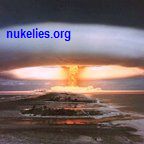Really?
http://www.msnbc.msn.com/id/44629271/ns/technology_and_science-science/?gt1=43001#.Tny7o-zvaSo
Faster than the speed of light?
6 posts
• Page 1 of 1
Re: Faster than the speed of light
I saw something about this too. Sounds interesting - neutrinos faster than the speed of light? Blows Einstein's theory away.
-

NUKELIES - Site Admin
- Posts: 302
- Joined: 17 Mar 2011 15:53
- Location: UK/USA
Re: Faster than the speed of light
The 'speed of light as an upper limit' idea is wrong.
This is how it happened: magnetic or electric fields are used to accelerate charged particles (e.g. electrons). In a vacuum, these move far faster than bullets etc., so they're obvious things to experiment with. BUT these fields themselves travel at the speed of light. Therefore, no amount of tugging at a tiny particle can ever make it go faster than light. Just a very simple mistake. It's why they thought that mass goes up with speed. It's part of the ridiculous confusions that make up the rubbish that is vaguely part of 'relativity'.
This is how it happened: magnetic or electric fields are used to accelerate charged particles (e.g. electrons). In a vacuum, these move far faster than bullets etc., so they're obvious things to experiment with. BUT these fields themselves travel at the speed of light. Therefore, no amount of tugging at a tiny particle can ever make it go faster than light. Just a very simple mistake. It's why they thought that mass goes up with speed. It's part of the ridiculous confusions that make up the rubbish that is vaguely part of 'relativity'.
-

rerevisionist - Site Admin
- Posts: 1056
- Joined: 18 Mar 2011 11:40
Re: Faster than the speed of light
rerevisionist wrote:The 'speed of light as an upper limit' idea is wrong.
This is how it happened: magnetic or electric fields are used to accelerate charged particles (e.g. electrons). In a vacuum, these move far faster than bullets etc., so they're obvious things to experiment with. BUT these fields themselves travel at the speed of light. Therefore, no amount of tugging at a tiny particle can ever make it go faster than light. Just a very simple mistake. It's why they thought that mass goes up with speed. It's part of the ridiculous confusions that make up the rubbish that is vaguely part of 'relativity'.
Right on, and the proof of it is easy too, if anyone would bother.
Accelerate the magnets first. Then their fields, moving at the speed of light relative to the magnet, are travelling FASTER than the speed of light relative to a stationary object and can thus accelerate the particles to faster than the speed of light.
Of course, they are too blinded by relativity and their group-think to even attempt this. I'd do it myself if I had a stopwatch that was accurate enough, although, to be honest, I am not sure why I should bother. They are in to deep to listen to an outsider.
- beren
- Posts: 3
- Joined: 24 Oct 2011 01:01
Re: Faster than the speed of light?
Neutrino experiment repeat at Cern finds same result
By Jason Palmer
Science and technology reporter, BBC News
The team which found that neutrinos may travel faster than light has carried out an improved version of their experiment - and confirmed the result.
If confirmed by other experiments, the find could undermine one of the basic principles of modern physics.
Critics of the first report in September had said that the long bunches of neutrinos (tiny particles) used could introduce an error into the test.
The new work used much shorter bunches.
It has been posted to the Arxiv repository and submitted to the Journal of High Energy Physics, but has not yet been reviewed by the scientific community.
The experiments have been carried out by the Opera collaboration - short for Oscillation Project with Emulsion (T)racking Apparatus.
It hinges on sending bunches of neutrinos created at the Cern facility (actually produced as decays within a long bunch of protons produced at Cern) through 730km (454 miles) of rock to a giant detector at the INFN-Gran Sasso laboratory in Italy.
The initial series of experiments, comprising 15,000 separate measurements spread out over three years, found that the neutrinos arrived 60 billionths of a second faster than light would have, travelling unimpeded over the same distance.
The idea that nothing can exceed the speed of light in a vacuum forms a cornerstone in physics - first laid out by James Clerk Maxwell and later incorporated into Albert Einstein's theory of special relativity.
Timing is everything
Initial analysis of the work by the wider scientific community argued that the relatively long-lasting bunches of neutrinos could introduce a significant error into the measurement.
Those bunches lasted 10 millionths of a second - 160 times longer than the discrepancy the team initially reported in the neutrinos' travel time.
To address that, scientists at Cern adjusted the way in which the proton beams were produced, resulting in bunches just three billionths of a second long.
When the Opera team ran the improved experiment 20 times, they found almost exactly the same result.
Continue reading the main story
Listen to Radio 4's In Our Time: The Neutrino
"This is reinforcing the previous finding and ruling out some possible systematic errors which could have in principle been affecting it," said Antonio Ereditato of the Opera collaboration.
"We didn't think they were, and now we have the proof," he told BBC News. "This is reassuring that it's not the end of the story."
The first announcement of evidently faster-than-light neutrinos caused a stir worldwide; the Opera collaboration is very aware of its implications if eventually proved correct.
The error in the length of the bunches, however, is just the largest among several potential sources of uncertainty in the measurement, which must all now be addressed in turn; these mostly centre on the precise departure and arrival times of the bunches.
"So far no arguments have been put forward that rule out our effect," Dr Ereditato said.
"This additional test we made is confirming our original finding, but still we have to be very prudent, still we have to look forward to independent confirmation. But this is a positive result."
That confirmation may be much longer in coming, as only a few facilities worldwide have the detectors needed to catch the notoriously flighty neutrinos - which interact with matter so rarely as to have earned the nickname "ghost particles".
Next year, teams working on two other experiments at Gran Sasso experiments - Borexino and Icarus - will begin independent cross-checks of Opera's results.
The US Minos experiment and Japan's T2K experiment will also test the observations. It is likely to be several months before they report back.
http://www.bbc.co.uk/news/science-environment-15791236
-

FirstClassSkeptic - Posts: 671
- Joined: 20 Mar 2011 21:19
Re: Faster than the speed of light?
Maybe Einstein mixed up photons and neutrinos? Nothing can go faster than a neutrino in the revised relativity theory of mine ... and we are back in business. I thought otherwise CERN was busy looking for the Higg's boson? Or maybe it is even faster than a neutrino ... and cannot be caught?  Or it doesn't exist at all?
Or it doesn't exist at all?

- Heiwa
- Posts: 53
- Joined: 22 Oct 2011 10:19
6 posts
• Page 1 of 1
Return to Science, Nuclear Physics, Astronomy, Space Travel
Who is online
Users browsing this forum: No registered users and 1 guest